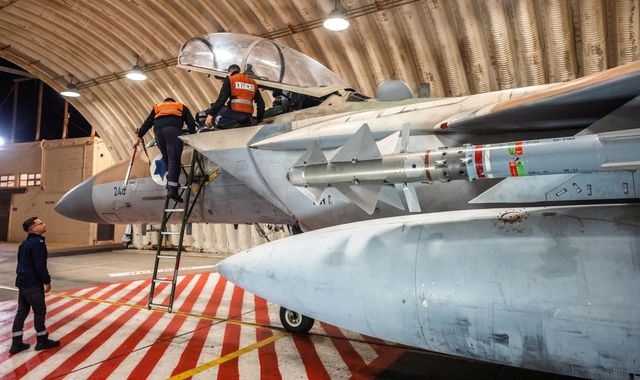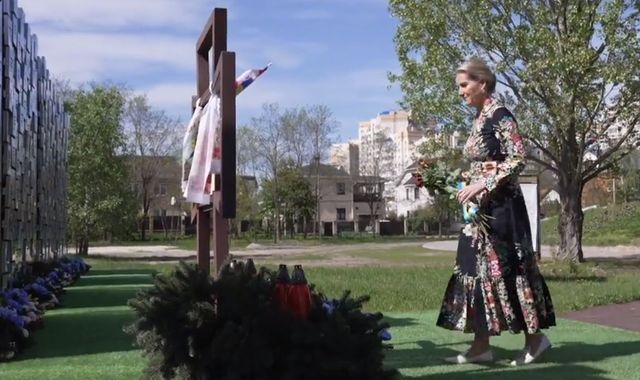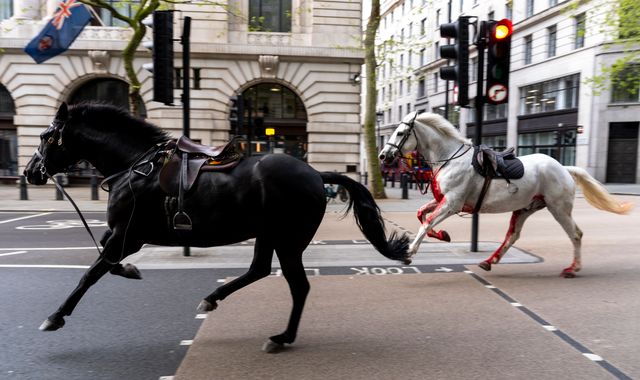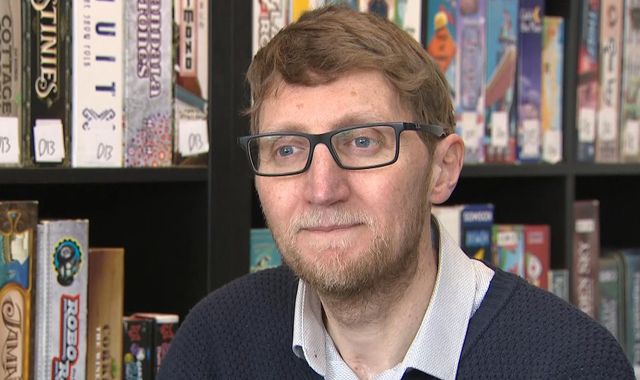Israel vows to respond to Iran attack as West calls for restraint
15 April 2024, 18:51 | Updated: 16 April 2024, 04:49

Israel has said there will be a response to Iran's drone and missile barrage over the weekend, as the UK and US urge Tel Aviv to not strike back amid concerns of a wider conflict erupting in the Middle East.
Israel's military chief Lt Gen Herzi Halevi said it is still considering its steps after Iran launched an attack with hundreds of drones, ballistic missiles and cruise missiles.
But he said the Iranian attack on Saturday "will be met with a response".
Follow live updates after Iran's attack on Israel
The attack - which saw the US, UK, France and Jordan help Tel Aviv down the missiles and drones fired at Israel - sparked significant concerns of an escalation in the conflict.
Prime Minister Rishi Sunak said "all sides must show restraint" and revealed that he would be speaking with Israel's Prime Minister Benjamin Netanyahu shortly, although this call was not expected to take place on Monday.
He faced further calls in parliament to proscribe the Islamic Revolutionary Guard Corps (IRGC) - Tehran's primary fighting force.
Mr Sunak responded by saying the organisation had been sanctioned - not proscribed - as a whole.
Responding to former home secretary Suella Braverman, he repeated that "as the right honourable lady knows, we don't comment on any potential proscription decisions".
Foreign Secretary David Cameron had earlier told Sky News that Iran had shown its "malign" nature, but its attack had been "an almost total failure".
Mr Cameron said the UK's "hope is that there won't be a retaliatory response" and he urged Israel to show restraint.
"This is a time to think with head as well as heart," the former prime minister said. "To be smart as well as tough."
Iran launched an attack almost two weeks after what it alleged was an Israeli strike on its Damascus consulate on 1 April that killed seven officers of the Islamic Revolutionary Guard Corps, including two senior commanders.
Tehran said its strike was punishment for "Israeli crimes". Israel has neither confirmed nor denied responsibility for the consulate attack.
Read more:
How Biden watched the Iranian attack - and what he told Netanyahu
Iran attack was 'declaration of war', Israeli president says - but 'we are seeking peace'
Biden 'committed to a ceasefire'
On Monday afternoon, it was reported Israel wants to embark on action against Iran co-ordinated with the US.
Following a meeting of Israel's war cabinet, Channel 12 News claimed Israel's objective is to hurt Iran without causing an all-out war.
If confirmed, the desire to conduct any joint-attack on Iran in response, along with the US, would appear at odds with comments attributed to Joe Biden.
Officials had said Mr Biden warned Mr Netanyahu that the US would not take part in a counter-offensive against Iran.
Mr Biden only publicly addressed Iran's attack on Monday, saying the US is "committed to Israel's security".
"We're committed to a ceasefire that will bring the hostages home and prevent the conflict from spreading beyond what it already has," the US president said, as he met Iraq's Prime Minister Mohammed Shia al Sudani in the Oval Office.
Mr Biden said he was also committed to "the security of our personnel and partners in the region, including Iraq".
During a White House press conference, US National Security Council spokesman John Kirby said reporting that Iran "meant to fail" in its attack and that it had given advanced warning of its strikes was "categorically false".
Iran 'becoming weaker and weaker'
Meanwhile, Reza Pahlavi, the exiled crown prince of Iran, has told Sky News that the Iranian regime is "becoming weaker and weaker and desperate by the minute".
He claimed that repression at home and aggression abroad has been "part and parcel" of the regime's basic strategy that has been trying to "export its ideology from day one".
Mr Pahlavi said Iran has wasted billions of dollars on weaponry that has "proved to be ineffective", while its citizens are queuing for food and fuel, "worrying about what could happen next under an extremely bad economic situation".
'Two-pronged approach'
Speaking on The World with Yalda Hakim, he said: "Our country is not going to benefit from this regime that doesn't spend a dime on the needs of our society. Instead, it finances its proxies in the region in order to maintain itself in power."
He added: "Iranians do not at all stand with what this regime stands for. What they call for is the exact opposite of what this regime is."

























